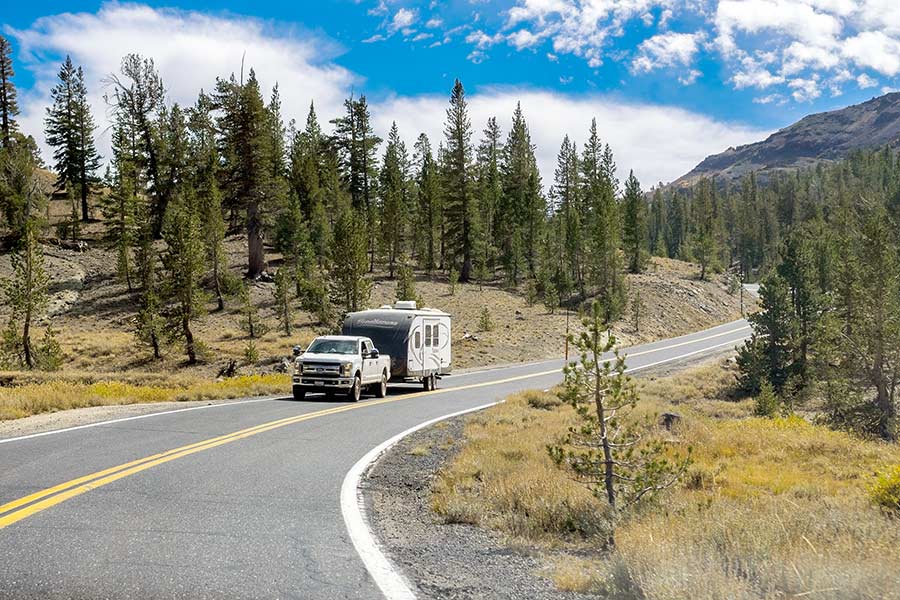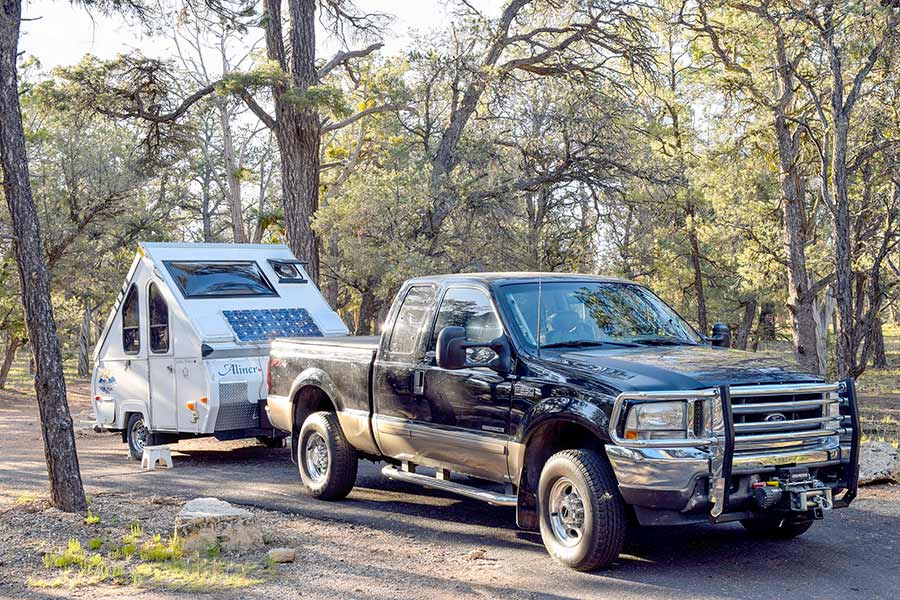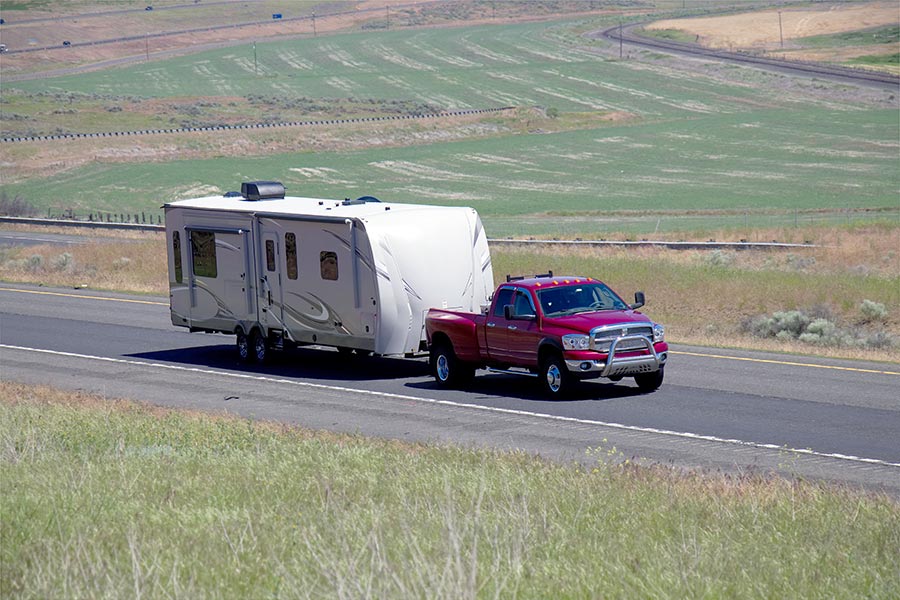
One of the most important and most easily overlooked parts of towing a travel trailer is braking. Be aware that the heavier your tow vehicle and trailer combination is, the longer it takes to stop it. After all, you want your RV to stop when your tow vehicle stops. So how does your trailer brake — do camper trailers have electric brakes?
Camper trailers almost always use electric brakes. Most campers will come with brakes installed, but some small campers on the market do not; whether your camper has electric brakes or not will depend on the trailer’s size and weight.
But is it mandatory to have trailer brakes? Why are trailer brakes a good idea? How can I tell if my camper has brakes or not? Find out the answers to these questions and more in the following post.
Brake It to The Limit – Understanding Your Camper Trailer’s Electric Brakes
Just like you’d want to learn the basics of your trailer’s water or electrical system, you should know how the wheels and brakes work. Knowing what they do and how they do it helps you understand how to do basic troubleshooting and make an informed purchase if you’re considering buying a new or used camper. Let’s take a deep dive into the world of electric brakes.
Camper trailers use electric brakes to stop. Electric brakes are brakes that are controlled by an electrically powered actuator. Regular brakes on your car or truck are powered by hydraulics: the pressure from the brake pedal pushes fluid to the brake pads and compresses them, generating stopping power. When the driver hits the brake pedal, the electricity activates a magnetic field that pulls the brake and drum together.
Why does your camper trailer need brakes anyway? In theory, when your tow vehicle slows down or stops, so should the trailer – right? Not necessarily. Brakes work by producing friction that slows down the rotation of the wheel. For example, if your tow vehicle tires slow down, but your trailer tires do not, your trailer could increase the overall stopping distance, cause the tow vehicle to become unstable, or even cause an accident. Trailer brakes help you keep control of your trailer and your tow vehicle.
So why would some trailers have brakes and other trailers not have brakes? The answer comes down to weight. If you are towing a small trailer, say a canoe trailer, the entire weight of the trailer and canoe is probably only a few hundred pounds. That is less mass, which means less momentum. In simpler words, it takes less force to stop a smaller amount of mass.
Applying this to camper trailers: your two-ton camper trailer will have a lot more momentum than a tiny canoe trailer, and therefore, it will be harder to stop. That is why trailer weight is linked to whether or not the trailer must have brakes. Trailers with more weight are harder to stop and therefore require extra braking power.
Most states have specific regulations that explain when your trailer is legally required to have brakes. Trailer brake regulations vary from state to state, and you must comply with the law of whatever state you are driving in. This variation makes it complicated to plan cross-country trips if your trailer doesn’t have brakes.
While AAA does have a chart of brake requirements laid out state-by-state, brakes are a safety feature that you won’t regret having. I would encourage you to keep your electric brakes in good working condition. After all, you never hear anybody saying, “Man, I wish I didn’t have brakes on my car — it just stops too fast!” This is especially true when towing a large object like a camper trailer.

So, what kind of camper trailers have electric brakes? The answer is almost all of them. The exception is smaller trailers, such as teardrop campers and pop-up campers. These campers weigh much less than a full-size travel trailer, and manufacturers may choose to reduce costs by not installing brakes.
Other Posts of Interest
- Winnebago Revel vs. Winnebago Boldt: Choosing The Right One
- RVs Built On A RAM ProMaster Chassis
- Do Most Campgrounds Allow Dogs? (And What Rules Are There)
- Thor Sequence vs. Coachmen Nova
Breakaway Systems
Trailers with brakes must have a breakaway system that will stop the trailer if it comes disconnected from the tow vehicle. This requirement is encoded in federal law (49 CFR § 393.43) and does not vary from state to state. Breakaway systems usually operate via a battery pack or a pull switch that actuates when the trailer breaks away. For surge brakes, a cable activates the emergency brake when the sensor becomes disconnected from the tow vehicle.
How Do I Know if My Camper has Electric Brakes?
The best way to learn if your trailer has electric brakes is to read the owner’s manual. However, if your trailer is secondhand or your owner’s manual is lost to the ravages of time, you should check with the manufacturer. Chances are they can send you a copy of the owner’s manual or, at the very least, tell you whether or not your trailer has electric brakes.
If you’re still unsure or the manufacturer doesn’t have relevant information, you can always check manually. To do this, get down and look under the tongue of the trailer. You should see a small box with wires coming out of it and running to the wheel hubs. This object should also have a connector end that plugs into your tow vehicle.
If your camper does not have electric brakes, you may be able to have them installed. It depends on whether your axle has a brake flange or not; a less than 3,000-pound axle will likely not have a brake flange. Of course, if it does, your installation costs will vary based on the components and labor costs. Even if you’re handy, you might want to leave this one to the pros. A skilled mechanic can install electric brakes for you. Brakes are super important for your safety and well worth the investment.

How Long do Electric Brakes Last on a Travel Trailer?
Electric brakes last about as long as tires – somewhere around 45 to 50,000 miles. So you should inspect your brakes every 3,000 miles or every three months to ensure that the brakes are correctly calibrated. In addition, you should have your trailer brakes inspected by a professional every 12,000 miles or once a year, just to ensure that everything is in working order. It would be a shame to be driving in the Smokies and suddenly realize your camper brakes are shot.
How Much Does it Cost to Replace Electric Brakes on a Travel Trailer?
Replacing the brakes on your travel trailer will cost you somewhere between $300 and $800, depending on your specific make and model of trailer. The number of axles and wheels supplied with brakes will obviously affect the cost, as will the heaviness of use: if you are a full-time RVer, your brakes will need to be replaced more often than those on a trailer used several weekends a camping season.
Do I Need a Brake Controller for Electric Brakes?
You need a brake controller for electric brakes. A brake controller is an electronic device that coordinates braking action between the tow vehicle and the trailer. When you hit the brakes in the tow vehicle, the brake controller sends electrical signals to the trailer brakes. The brake controller regulates these signals.
There are basically two kinds of brake controllers: proportional controllers and time-delayed controllers. Time-delayed controllers detect when you apply the brakes in your tow vehicle and then sends a signal to apply the trailer brakes. In addition, the controller has an adjustment setting for braking force and time delay based on the trailer weight, road conditions, and personal settings.
Proportional controllers have a sensor that measures the inertia of the trailer and then applies the correct amount of force to the trailer brakes, allowing the trailer to brake at the same rate as the tow vehicle, from a gradual stop to an emergency braking situation. As a result, stops will be stable and balanced.
Brake controllers might sound complicated and expensive, but they are really pretty inexpensive. A top-of-the-line brake controller might set you back $260 or so, but you can get a high-quality brake controller for about $50 that will get the job done.
Stopping on a Dime
Brakes might not be the most exciting or fun topic of conversation, but these little guys are essential to safe RVing. After all, some of the best scenery in the nation is found in hilly or mountainous locations. So you definitely want to make sure that your travel trailer and your tow vehicle are both prepared to deal with the ups and especially the downs of hilly environments.
Knowing about your brakes will help you operate your vehicle in the safest way possible, and knowing how your safety features work provides peace of mind when you’re on the road to your next destination. So until next time, keep the shiny side up and the dirty side down. Stay safe, campers.






